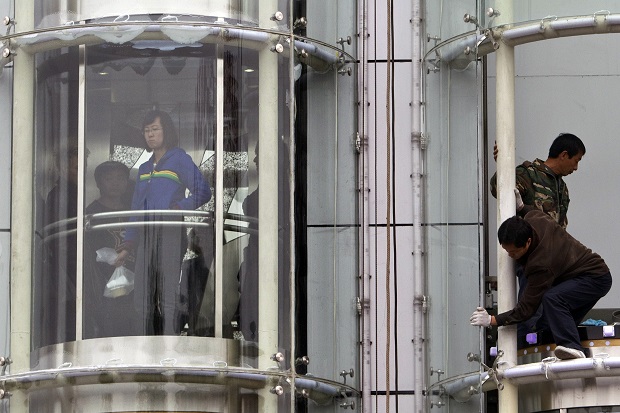As China slows, manufacturers feel drag

In this Oct. 21, 2010 file photo, workers, right, prepare to install a piece of glass wall covering an elevator tunnel while a woman, left, looks down from a descending elevator in Beijing, China. Otis elevator, which has staked much on increasing urbanization and soaring skyscrapers in cities across China, is struggling with declining revenue in 2015 as China’s economy sours. AP
HARTFORD, Connecticut, United States — As China’s economy has grown and skyscrapers sprouted in cities extending ever westward from the Pacific coast, Otis Elevator Co. went along for the ride.
But with China now in a slump and the value of its currency the most recent casualty, Otis and other manufacturing companies staking much on Asia’s biggest economy now face a moment of reckoning. After saying for years that increased urbanization would propel growth in China, parent company United Technologies Corp., based in Hartford, cut its expected revenue and profit for the year, due partly to the slowdown across the Pacific.
“It’s tough to get this bad news out,” Greg Hayes, chief executive of United Technologies, said in a call with investor analysts July 21 when second-quarter profit and revenue results were released. “The slowdown in China is worse than what we had expected.”
Executives at Otis, based in Farmington, Connecticut, declined to comment for this article.
Construction in China in recent years was dramatic, with “cranes everywhere,” driven by national pride demanding ever-taller skyscrapers, said Siva Yam, president of the United States of America-China Chamber of Commerce. The result, he said, was price speculation for land that could not be sustained, particularly as growth slowed.
For Otis, the fall has been steep and embarrassing.
Otis was founded in 1853, installed its first elevator in Shanghai in 1900, has six factories that make elevators and escalators for markets in China and elsewhere, and operates engineering research and development centers in two Chinese cities.
Sales have slowed this year over 2014, falling 7.5 percent in the first six months of the year compared with the same period in 2014. In contrast, revenue had jumped 4 percent, to about $13 billion, last year over 2013.
Other manufacturers relying on construction also report a tougher reception in China. Caterpillar cut its revenue forecast for the year. Lower construction-related sales in China and Brazil are among the problems. Elevator and escalator manufacturer Schindler said Aug. 14 it expects limited strength in the global market this year, with China “at most expected to achieve minimal growth” in 2015.
“Most companies doubled down on China, thinking it was going to be a huge market for them, and now they’re stuck,” said Lawrence T. De Maria, an analyst at William Blair & Co. financial services who follows Caterpillar.
More than 60 percent of companies that belong to the American Chamber of Commerce in China reported increased revenue in China last year, but down from 71 percent in 2013 and 2012; 42 percent reported increased profit margins in 2014, down from 48 percent in 2013. And 31 percent said they had no plans to increase investment in China this year, the most since the recession year 2009.
“Growth is clearly slowing in China,” said John Frisbie, president of the U.S.-China Business Council. “Companies are seeing a slowdown in their revenue growth.”
For Otis, rising competition, particularly for the lucrative repair and maintenance business, also is undermining its Chinese market.
Just this May, Hayes told investor analysts that Otis maintains and repairs 1.9 million elevators worldwide, creating a “phenomenal” stream of income and making Otis “the jewel of the UTC portfolio.”
But European elevator manufacturers are coming on strong in China, followed by Japanese and Korean competitors, said Lee Gray, who studies elevators and escalators as an architectural historian at the University of North Carolina at Charlotte.
Rivals have learned from Otis, which became a household name by aggressively marketing itself and absorbing competitors in the 19th century.
“Where in the early 20th century Otis was making significant inroads in Europe, in this century it’s the reverse,” Gray said.
The competition and other factors are taking a toll. Hayes told analysts last month that in the past 10 or 15 years, “we’ve seen a continued erosion of Otis’ market share” in the pursuit of wider profit margins.
The decline in Otis’ market share in China, to about 15 percent from 25 percent a decade ago is “shocking,” particularly because until recently China represented as much as 75 percent to 80 percent of all new global elevator sales, Nicholas Heymann, an analyst at William Blair & Co., said in a July 21 note to clients.
“Often this type of extended gradual erosion of a company’s business franchises takes more than cost reduction to fix,” he said.
The competition was brought into focus in late July in the central city of Jingzhou when a platform at the top of a shopping mall escalator not made by Otis collapsed, killing a woman and raising questions about China’s rapid growth at the expense of product safety and quality.
It’s not only competition that’s chipping away. Otis’ high-tech elevator system known as Gen2, which is promoted for taking up less space than other elevators, has been rejected by residential customers because of its high price, said Cowen and Co. analyst Cai von Rumohr.
“They were pushing Gen2 and in a residential market, the market wanted just the cheapest available,” he said.
Still, no one is counting Otis out. Heymann called it the “premier franchise within the industry and in UTC,” but said its troubles will require long-term attention.
Above all, it has the name.
“Otis is very good at marking their elevators,” Gray said. “The doors open and you see ‘Otis.'”